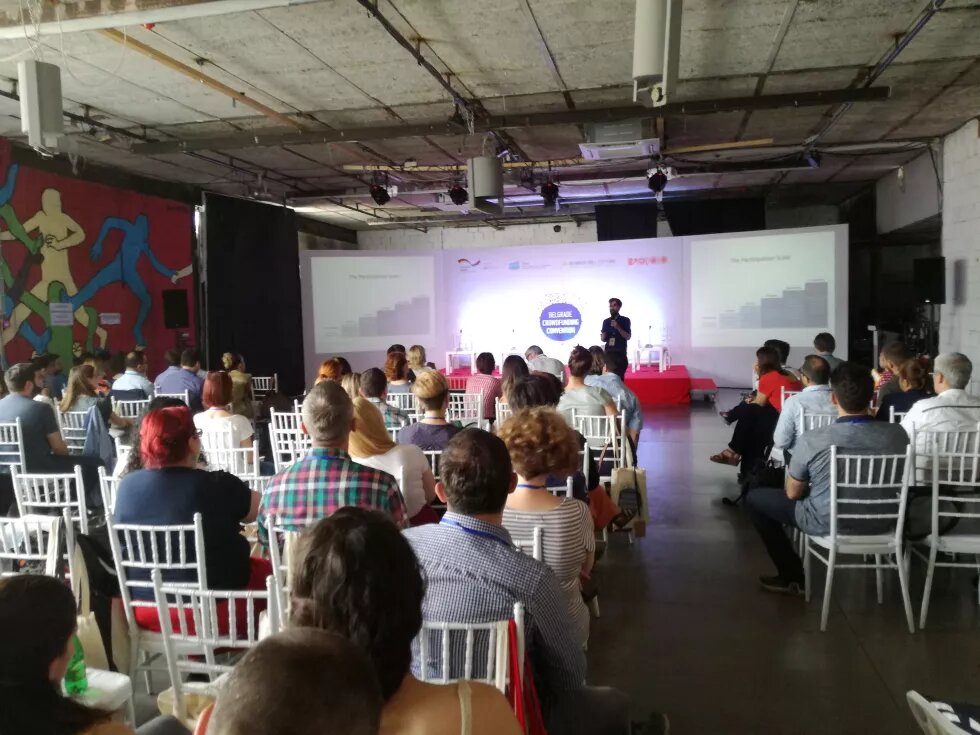
The first Belgrade Crowdfunding Convention was held on 7 June 2017. The meeting was organized by the German-Serbian Initiative for Sustainable Growth and Employment, the Team for Social Inclusion and Poverty Reduction (SIPRU), the Heinrich Böll Foundation and the Brodoto agency, and was attended by a large number of participants from Serbia, the Balkan region at large, and Europe. The themes discussed were of exceptional public interest.
In his introduction, Alexander Jung, deputy German ambassador to Serbia, said that “crowdfunding represents a potential solution for problems faced by business people”, but that, in order for it to develop, an adequate legislative framework was essential.
Convention proceedings offered an abundance of useful information on crowdfunding as an alternative mechanism of financing, and also about an industry which is recording continued growth all over the world. Karsten Wenzlaff from IKOSOM, the German Crowdfunding Association, described several successful and unsuccessful crowdfunding campaigns. He stressed that “a business must be sustainable”, and that “this method of financing cannot also be the end of your ideas”. He also raised the question of what to do “after being successful”, and he also warned of the danger of crowdfunding scams which have a bad effect on this field and on the confidence of potential contributors. “As the Gross Domestic Product of a country grows, so does the crowdfunding market grow”, was how Wenzlaff explained the difference in development of this form of financing between the developed and less developed countries of Europe.
Presenting results of research into crowdfunding in Serbia, Marko Gregović of Brodoto reported that, up to mid-2016, a total of 653,134 US dollars had been paid into crowdfunding campaigns in Serbia while, in comparison, in Great Britain, as much as 720,000 dollars is paid in every five days. According to Gregović, of a total of 570 campaigns in Serbia, only 41 were successful, and the most numerous were projects from the field of art (which comprised 32 per cent of the total). He further stated that women lead only 27 per cent of campaigns and that in Serbia, the “Kickstarter” campaign platform is more successful than “Indiegogo”.
During panel discussion devoted to the question why Slovenia is a super-power in the domain of crowdfunding, Luka Piškorič from “Poligon”, a platform for the development of not-for-profit and for-profit projects, explained that crowdfunding had helped to bring about changes in Slovenian society: “In Slovenia, crowdfunding has created a community of which the members, from various professional fields and with differing experiences of life, take part in creating and implementing initiatives which necessarily carry with them positive social changes”. In his words, for a successful crowdfunding campaign, it is essential to have “good social capital”.
In a consideration of the further steps needed for crowdfunding in Serbia, Karsten Wenzlaff, Luka Piškorič, Natalija Sandić (Innovation Fund Serbia) and Nathan Koeshall (Catalyst Balkans) all stressed that crowdfunding offers potential for new creative movements, and also a form for the democratization of society which ought to be supported by educational institutions, particularly faculties of arts. They also emphasized that one of the obstacles to the success of crowdfunding in Serbia is the non-existence of adequate legal regulations.
Participants who spoke about their experiences with crowdfunding in Serbia were Zoja Kukić from the Startit Center, Jovana Ružičić from Support Moms in Serbia, as well as Aleksandar Pavlić and Laurent Rouy, both of whom had made films financed through crowdfunding – in the first case a documentary devoted to the musician Vlada Divljan, and in the second a feature film about migration. The members of this particular panel highlighted the importance of personal contact and friendships when collecting money, and also the fact that anyone who opts for crowdfunding must have genuine motivation and a great deal of patience.
Successful regional crowdfunding campaigns were presented by guests from Croatia: Roberta Mesić (from the initiative “Buba Bar”, through which people with special needs could be employed in a café-bar), Ana Teskera (one of the owners of the Brlog cooperative brewery, which makes its own “Plavuša” [“Blonde”] beer), and Domagoj Štivić from the Makerbuino Company which, thanks to crowdfunding, has produced a console for games which its users design themselves with the help of online instructions. Like their colleagues in Serbia, they all stressed the importance of marketing, personal contacts – and also the investment of a huge amount of effort, time and patience.
Several suggestions for crowdfunding campaigns were presented at the convention, and, for the project with the greatest potential, the public voted for the Škograd project - a blog devoted to the idea of building new schools on the edge of a large city, in this case in the Belgrade settlement of Ledine - which also won a financial prize.
The meeting concluded with a presentation of the steps towards a successful crowdfunding campaign. Kristina Lauš from Brodoto, pointed out that crowdfunding is a transparent process, and that an important factor was the trust of those who financially support specific projects. She added that, thanks to campaigns which have social influence, the initiators and those who support them financially become “agents for social change”.
More on crowdfunding in Serbia can be found on www.crowdfunding.rs, where one can also sign up for a newsletter.